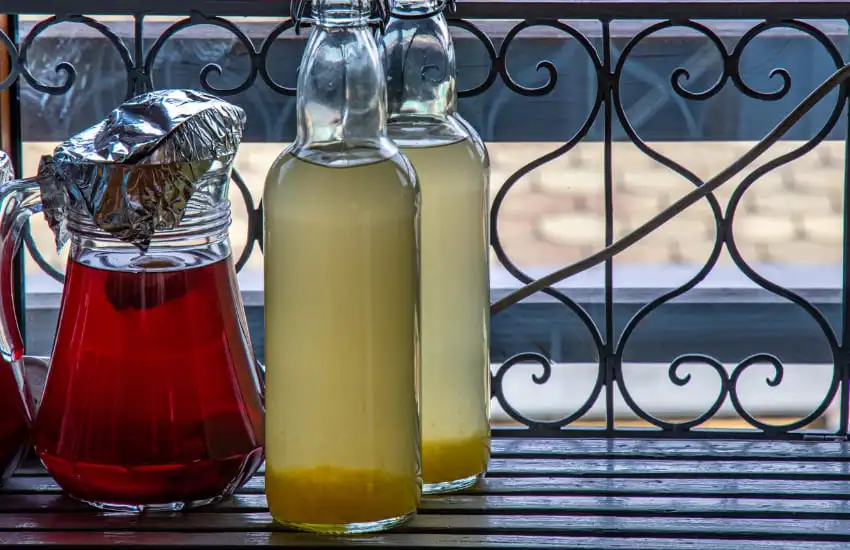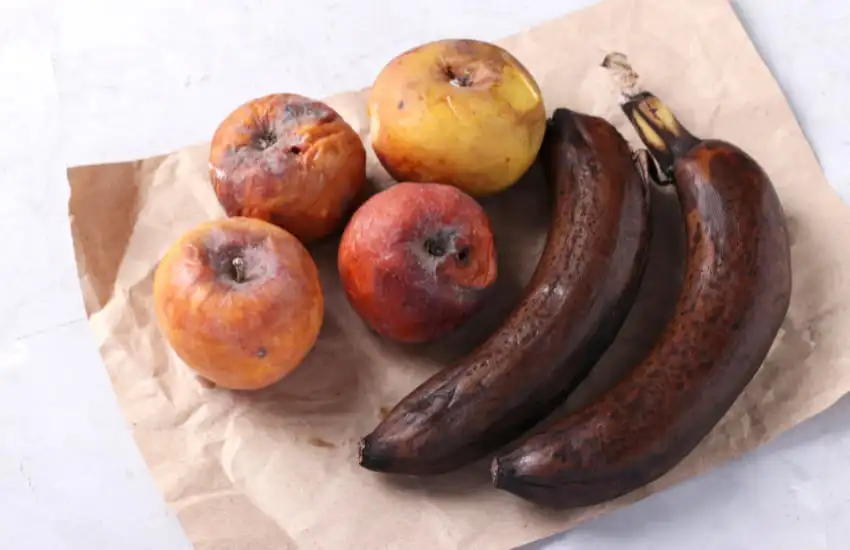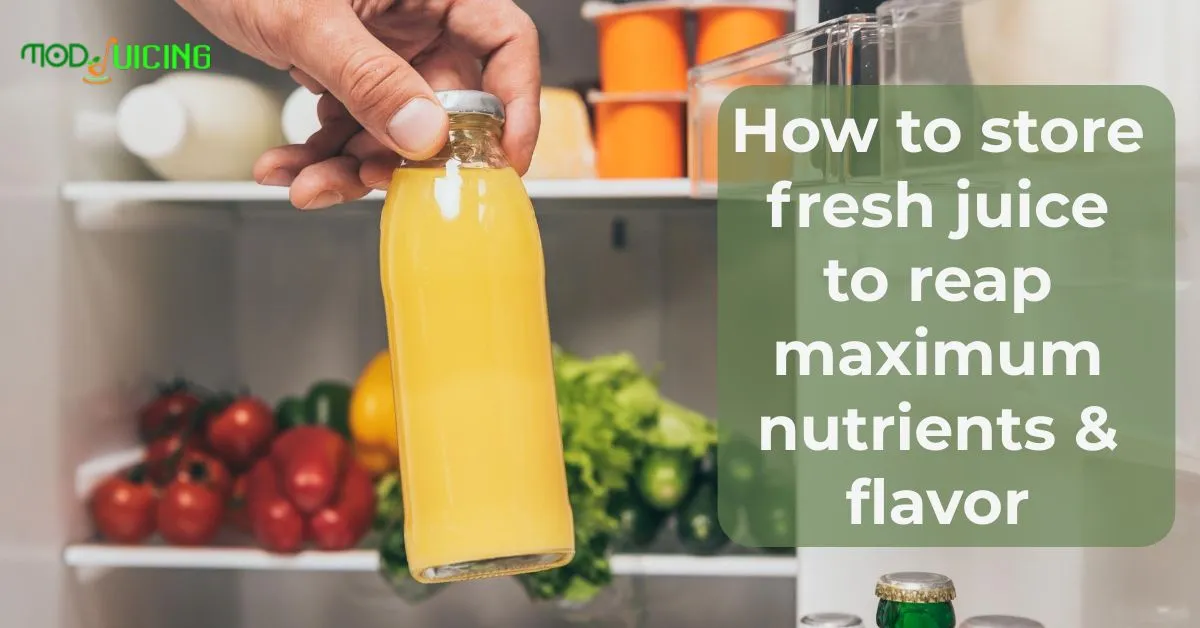A diet rich in fruits and vegetables does not have to be complicated. You can accomplish this by drinking freshly squeezed juices. Juicing is important because different fruits and vegetables offer a variety of nutrients. You can get a wider range of these nutrients and enjoy their health benefits by juicing.
In today’s busy world, no one has time to prepare fresh juice every time. So, people juice their preferred fruits & veggies in bulk and store them to drink later. But proper storage of fresh juice is crucial to maintain its nutrients and flavor. So how to store fresh juice keeping maximum nutrients and flavor?
Here, we’ll discuss the importance of storing fresh juice properly and offer some tips on how to do so.
Why do you store juice after juicing?
Is your day start with repeating the juicing process? Everyday, you clean, slice & put the fruits & veggies into the juicer to get a glass of juice. Sometimes it feels tedious to do a task repeatedly. Did you ever think of extracting a whole lot of juice & store it for months like packaged juices to get rid of grueling practice?
Yes, it’s possible with the right steps. Otherwise, you’ll have to compromise on the overall quality of fresh juice. The problem with fresh produce is that it can lose nutrients rapidly after juicing. But you can definitely store it correctly for a limited timeframe which we’ll discuss later.
What are the factors that affect the quality of fresh juice?
Oxidation & micro-organisms are two significant factors or reasons that degrade juice ingredients. Fresh juices have no pasteurization or preservative process, making them more prone to spoilage. Fruits & vegetables are perishable commodities that last for a short time.
Some other factors like produce freshness, juicing procedure, and storage place & duration may affect the quality of the juice.
Why is it important to store fresh juice properly?
It’s important to store fresh juice properly to retain its nutritional value and prevent it from going bad. Poorly stored juice can get affected by microbes & oxidation, ultimately losing its nutrient content.
Additionally, storage methods that use heat or chemicals can damage the nutrients in fresh juice. Consequently, choosing the best storage method is crucial for preserving the nutritional value of the juice.
Can homemade juice be stored?
Yes, you can store homemade juice if appropriately handled. You can find some valuable facts & figures about the longevity of fresh juice in this detailed post. There are a few storage techniques to keep homemade juice fresh, which depend upon the time.
For short-term storage, you can keep homemade juice in the fridge for a maximum of 3 days. For long-term storage, you can freeze homemade juice for up to 12 months.
How to keep fresh juice from turning brown?
Slicing & juicing expose the produce to oxygen-filled air. Which triggers the oxidation process. Oxidation is a chemical reaction between oxygen & plant chemicals that turns their color brown. Try to consume the juice as soon as possible to avoid any changes in color or taste. But if you make juice in bulk or want to store it for future use, below are some tips to minimize oxidation:
- Soak fruit & vegetable slices in plain water; if they float, cover them with a paper towel to avoid air exposure.
- After juicing, immediately keep the juice in the fridge to cool it down; that’ll slow the chemical reaction.
- Keep the juice away from direct sunlight.
- Add 1-2 tablespoons of lemon or any other citrus juice per serving.
- Make sure the container is clean & closed airtight.
- If suitable, add a few ice cubes, as these will chill your drink quickly and stop the juice from turning brown.
How to keep fresh juice from separating

Fresh juice contains a mixture of lighter and heavier ingredients. When kept, these components tend to separate naturally. In juices, heavier components like fiber & nutrients usually settle at the bottom or float separately in lighter part’ water’.
This separation doesn’t indicate any harm to the quality of the liquid. Just shake your juice & drink. Commercial brands use stabilizers & other chemicals to prevent separation & color change, which obviously affects the taste & appearance of the juices.
Tips for Storing Fresh Juice to Retain Nutrients and Flavor
You can do several things to store fresh juice to retain its nutrients and flavor. Follow these tips to ensure optimal storage purposes.
1. Buy fresh fruits and vegetables
The fresher the ingredients, the more flavorful and nutritious your juice will be. To maximize your results, purchase ripe fruits and vegetables that are in season. Buy a required batch of produce only.
2. Wash everything
When handling food, it’s vital to ensure your hands and all related items & surfaces are clean. That includes the container or bottle. Start by washing your hands, then wash the container and juicer. Also, remember to wash fruits & veggies. Rinse well and set them aside to air dry.
3. Store juice in a cool, dark place
Light and heat can cause nutrients in juice to break down. Keeping juice in the fridge or freezer will save it from heat & light.
4. Fill the container to the top
Fill your container to its fullest capacity. This will help minimize air exposure, which can cause oxidation. Once oxidized, the juice ingredients start degrading within no time.
5. Use glassware
Pour your juice into a glass container, mason jar, or bottle. The closed top lids keep them airtight and limit airflow. Plastic or other metallic wares may react with food chemicals.
6. Add a layer of protection
To further limit oxygen & microbes exposure, you can seal top of the container with plastic wrap or a coffee filter.
7. Drink soon after juicing
For the best flavor and nutrient quality, it’s best to drink homemade juice immediately after juicing or refrigerate it and consume it within 24 hours. If you need to store it for up to 3 days, keep it refrigerated; for longer than that, freeze it properly.
8. Wash the juicer after juicing
Wash your juicer & accessories every time after juicing and place them in a dust-free closet.
Why Some Juices are More Prone to Oxidation Than Others

Some juices are more prone to oxidation than others due to their chemical composition. For example, juices made with citrus fruits like lemons and oranges are more prone to oxidation than other types of juices because they contain higher levels of citric acid.
The Different Methods of Storing Fresh Juice
There are several different methods you can use to store fresh juice. The most common household methods are refrigeration and freezing. However, you can also use other methods, such as vacuum sealing or canning, which are primarily for commercial purposes. Every method has its pros and cons that you should consider before choosing a storage method.
Refrigeration
Refrigerating fresh juice is one of the most common storage methods because it’s quick and easy. Additionally, refrigeration helps slow down the process of oxidation & microbes growth so that your juice stays fresher for extended periods. However, refrigeration does not stop the process of oxidation completely; over time, refrigerated juices will still lose some flavor and nutritional quality.
Additionally, some fruits and vegetables do not respond well to refrigeration; for example, bananas become mushy when refrigerated. Therefore, it’s important to research & observe which fruits and vegetables are best suited for refrigeration.
Freezing
Freezing is another popular storage method for fresh juice because it helps preserve flavor and nutritional quality. When done correctly, freezing can help juices retain their flavor and nutritional quality for up to 12 months. Additionally, freezing helps prevent the growth of bacteria so that your juice is safe to consume for longer periods.
However, it’s important to note that frozen juices will have a different texture than fresh juices; they will be thicker and less refreshing. Additionally, some fruits and vegetables do not react well to freezing; for example, berries tend to become mushy when frozen.
Vacuum Sealing
Vacuum sealing is a storage method that involves removing all the air from a container before sealing it. This helps prevent oxidation by keeping oxygen away from the juice. Additionally, vacuum sealing helps preserve flavor and nutritional quality by preventing evaporation. However, it’s important to note that vacuum sealing is only effective if done correctly; if not, vacuum-sealed juices can spoil.
Canning
It is a storage method that involves boiling juice to kill bacteria and sealing it in an airtight container. This helps preserve the flavor and nutritional value of juice for long periods. Additionally, canned juices are shelf-stable and need not be refrigerated or frozen. However, it’s important to note that canned juices have a different flavor than fresh or frozen juices and may be less nutritious than fresh ones.
Conclusion
Proper storage of fresh juice is essential for retaining its flavor and nutritional quality. You got to know some storage methods to store freshly squeezed juices, but which one to adopt? It depends on your storage time & ease of work. In household usage, only refrigeration & freezing would be the best options as these don’t require much effort or special equipment.
